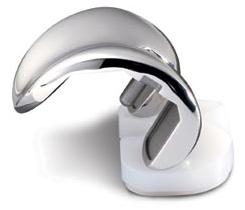Zimmer NexGen Knee Implant Device Loose After 2 Years.
Should Last 15 Years.

Several Zimmer Artificial Knee Implants Recalled
In December 2010, the FDA announced a recall by joint implant manufacturer Zimmer Inc. of the NexGen Complete Knee Solution LPS Femoral Components. The devices were shown to exhibit a nonconforming internal CAM radius, although not every device was believed to be defective.
In September 2010, a recall was issued for the NexGen Complete Knee Solution MIS Tibial Components. This device was recalled after receiving complaints of loosening that often resulted in patients undergoing painful and expensive revision surgeries.
Rights of Victims
The failure of certain Zimmer artificial joint devices can cause symptoms such as pain, looseness, instability and swelling at the site of the implant, and can ultimately lead to revision surgery. Revision surgery is costly and painful. Recovery takes at least as long as the original surgery, and for many people, this means a detrimental loss of income, on top of extensive hospital bills. Patients who have suffered early device failure, especially that which leads to revision surgery, deserve compensation for the associated physical, financial and emotional losses. Compensation can be obtained by filing a claim against Zimmer with the help of one of the experienced and aggressive personal injury attorneys of The Oshman Firm.
Research Discovers Additional Zimmer Implant Failure
As part of the mounting public scrutiny over under-regulated medical devices, prominent medical experts have expressed grave concern over the serious risks associated with another popular Zimmer knee implant device: NexGen CR-Flex. The NexGen CR-Flex Knee Implant is intended for total knee replacement.
Some doctors have found that the porous non-cement femoral component of the device (the part that covers the head of the femur or thigh bone) is prone to high failure rates. Two renowned Chicago orthopedic surgeons—Richard Berger and Craig Della Valle from Rush University Medical Center—argue that Zimmer’s NexGen CR-Flex Knee Replacement devices should not be used on any patient, given their high risk of failure and serious side effects.
It was increasing concern over the NexGen CR-Flex that prompted Berger, a former Zimmer consultant, and Della Valle to conduct research on the implant. The study found that within two years of Zimmer NexGen CR-Flex knee implantation, 36 percent of the implants of study participants were loose and more than 8 percent required revision surgery due to looseness and serious pain. Dr. Berger describes this failure rate as “horrific.”
MDL Con solidation Strengthens Lawsuits Against Zimmer
solidation Strengthens Lawsuits Against Zimmer
Those involved with suits against Zimmer regarding certain NexGen knee replacement products have won the right to have their actions consolidated into an MDL (multidistrict litigation). This was an important step for those who have filed claims and those who are considering filing. Now the MDL plaintiff steering committee can help these clients and their cases by working together and sharing information to build a stronger attack against Zimmer.
Have You Been Injured by an Artificial Joint Made by Zimmer?
If you or a loved one has received a failing Zimmer NexGen knee replacement device, you may have a legal case against Zimmer. Please contact the qualified and skilled medical device attorneys of The Oshman Firm who will listen to your story and determine the best way to help you receive compensation for medical expenses and lost income, as well as your physical and emotional suffering.
Lack of Safety Testing on Medical Devices in US
According to a New York Times report, US orthopedic medical device makers are not required to submit safety data prior to FDA approval if a similar device has already been approved, making it difficult to determine the true safety of each medical device on the market today. This questionable process, known as 510(k) approval, is considered outdated and unsafe by many experts in the medical device field. As the news report attests, “those with the most to lose [from this lack of safety testing and reporting] are the hundreds of thousands of people who receive an orthopedic device each year.”



